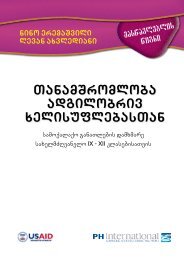The Geneva Protocol, by David Hunter Miller
The Geneva Protocol, by David Hunter Miller
The Geneva Protocol, by David Hunter Miller
You also want an ePaper? Increase the reach of your titles
YUMPU automatically turns print PDFs into web optimized ePapers that Google loves.
CHAPTER XX. 122<br />
provided in {200} Article 11, it becomes a regulating, or rather an advisory, body, but not an executive body.<br />
<strong>The</strong> nature of the acts of aggression may vary considerably; the means for their suppression will also vary. It<br />
would frequently be unnecessary to make use of all the means which, according to paragraphs 1 and 2 of<br />
Article 11, are, so to speak, available for resisting an act of aggression. It might even be dangerous if, from<br />
fear of failing in their duties, States made superfluous efforts. It will devolve upon the Council, which, under<br />
Article 13 can be put in possession of the necessary data, to give its opinion, should need occur, as to the best<br />
means of executing the obligations which arise directly it enjoins the application of sanctions, especially as to<br />
the sequence in which the sanctions must be applied.<br />
<strong>The</strong> practical application of the sanctions would, however, always devolve upon the Governments; the real<br />
co-operation would ensue upon their getting into touch, through diplomatic channels--perhaps <strong>by</strong><br />
conferences--and <strong>by</strong> direct relations between different General Staffs, as in the last war. <strong>The</strong> Council would,<br />
of course, be aware of all these negotiations, would be consulted and make recommendations.<br />
<strong>The</strong> difference between the former state of affairs and the new will therefore be as follows:<br />
According to the system laid down <strong>by</strong> the Covenant:<br />
1. <strong>The</strong> dispute arises.<br />
2. In cases where neither the arbitral procedure nor the judicial settlement provided for in Article 13 of the<br />
Covenant is applied, the Council meets and discusses the dispute, attempts to effect conciliation, mediation,<br />
etc.<br />
3. If it be unsuccessful and war breaks out, the Council, if unanimous, has to express an opinion as to which<br />
party is guilty. <strong>The</strong> Members of the League then decide for themselves whether this opinion is justified and<br />
whether their obligations to apply economic sanctions become operative.<br />
4. It then has, <strong>by</strong> a unanimous decision, to recommend military sanctions.<br />
{201}<br />
5. If unanimity cannot be obtained, the Council ceasing to take action, each party is practically free to act as it<br />
chooses.<br />
According to the new system defined in the <strong>Protocol</strong>, the situation is as follows:<br />
1. <strong>The</strong> dispute arises.<br />
2. <strong>The</strong> system of peaceful settlement provided for <strong>by</strong> the <strong>Protocol</strong> comes into play.<br />
3. <strong>The</strong> Council intervenes, and if, after arbitration has been refused, war is resorted to, if the provisional<br />
preventive measures are not observed, etc., the Council decides which party is the aggressor and calls upon<br />
the signatory States to apply the sanctions.<br />
4. This decision implies that such sanctions as the case requires--economic, financial, military, naval and<br />
air--shall be applied forthwith, and without further recommendations or decisions.<br />
We have therefore the following new elements:<br />
(a) <strong>The</strong> obligation to apply the necessary sanctions of every kind as a direct result of the decision of the<br />
Council.
















